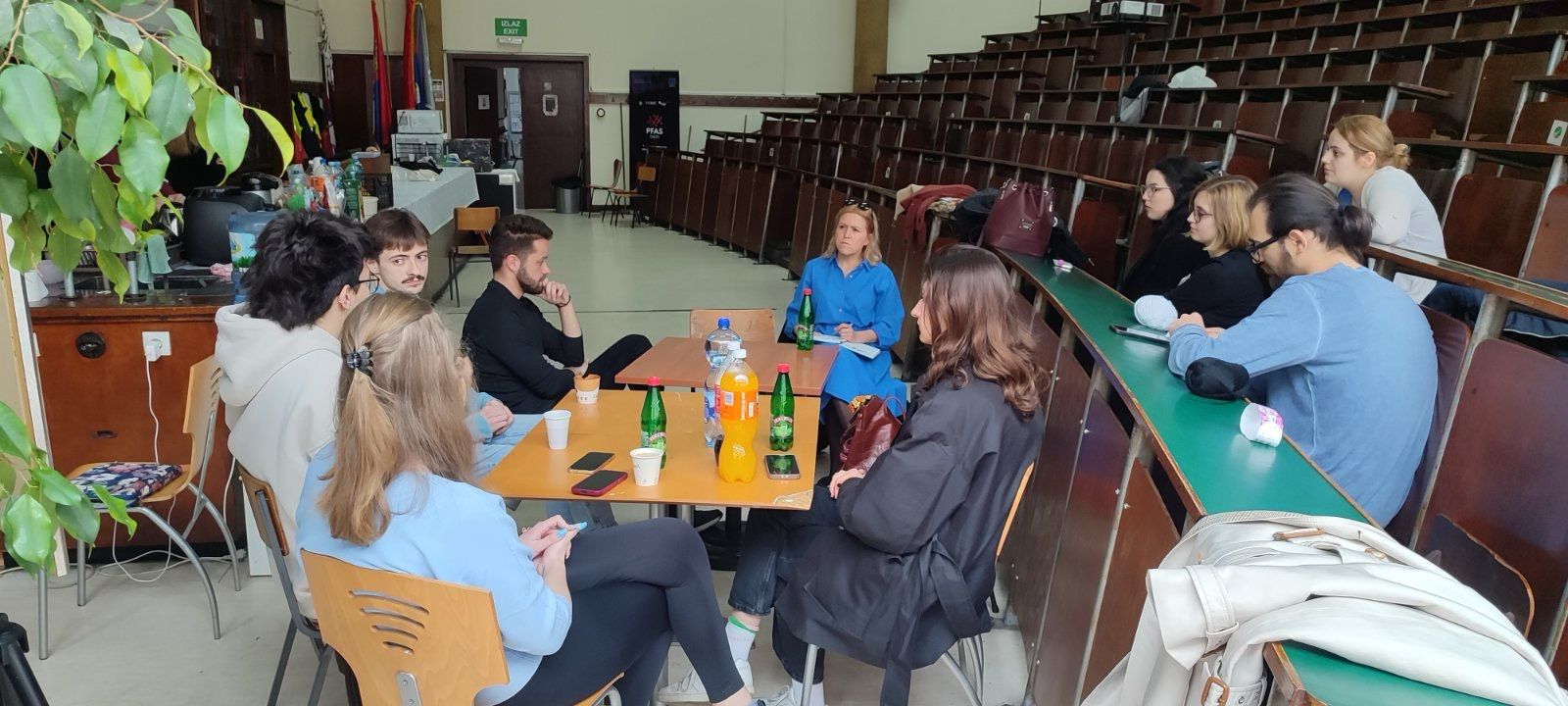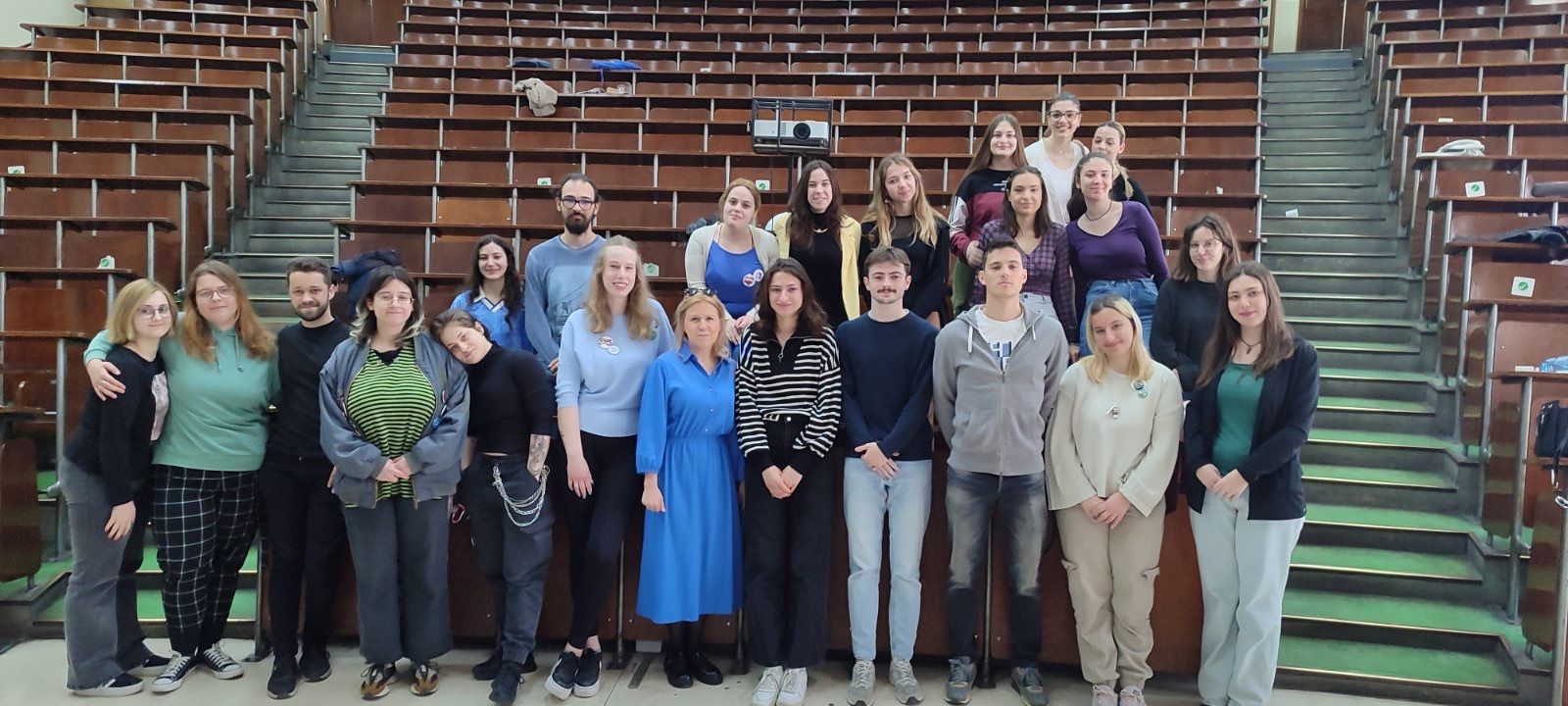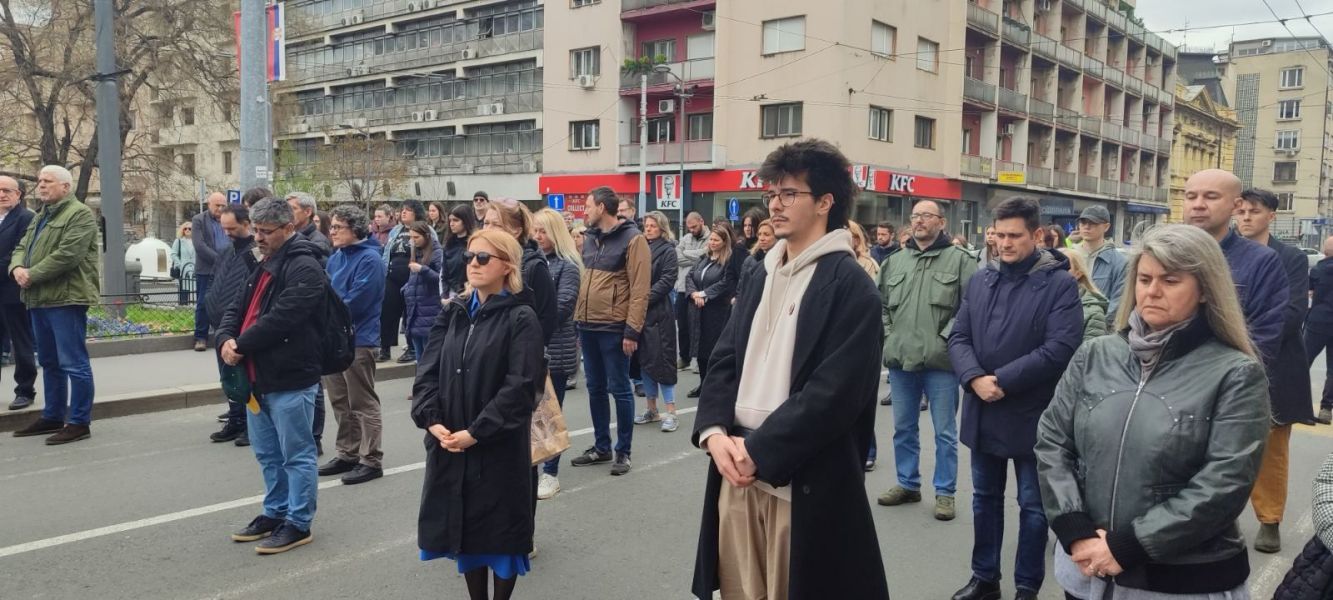"I arrived in Belgrade on March 29 with the intention of speaking with students and friends who work at the University. I have been visiting Belgrade since 2008, I speak Serbian, and I have wonderful friends there, as well as professional partners. Over these nearly 17 years, I have had many conversations, observed changes, read, and tried to understand this country and its people. On my very first day, I spoke with my friend Tatjana Verbić, a professor at the Faculty of Chemistry, Univ. of Belgrade. As long as I have known her, the most important memories and moments that have shaped her life are tied to political events in this country. I won’t go back to the war years of 1991–1995, which left a deep mark on all the countries of the former Yugoslavia and still loom over them like a dark cloud, as if a storm were near," says Dr Joanna Morawska from the AMU Faculty of Human Geography and Planning
Joanna Morawska: Tatjana, I have the impression that what is happening now is another pivotal moment for you, but in a different way. Please explain.
Tatjana Verbić: Unfortunately, protests are our everyday life for decades. For me, the most significant ones were those that lasted from November 22, 1996, to January 27, 1997. I was a student then. Without going into details, we protested against Slobodan Milošević and for free elections, democracy, and truth. It was a beautiful time, but it did not bring a change in the system, mainly because the opposition parties could not reach an agreement.
The next major protests were in 1999, when nearly the entire nation united against NATO’s bombing of Serbia (at that time Yugoslavia) in connection with the Kosovo conflict. At that time, we also protested against Europe—or rather, against the policies of Western countries. Then came the crisis of 2003 after the assassination of pro-democracy Prime Minister Zoran Đinđić. Another significant moment was two years ago, when school shootings killed several people, and no one was held accountable. There were 2 shootings, on May 3 in an elementary school in Belgrade, 10 people were killed (9 school kids and a door keeper), and in the night of May 3-4, 9 young people were killed in villages near Belgrade. I could list many more examples—lying and manipulative television, widespread corruption, deceit, financial difficulties, immigration issues, and completely incomprehensible construction projects… Our country's governance simply does not function.
………………………………..
To provide some context: On November 1, 2024, part of the Novi Sad Railway Station, one of Serbia’s major transport hubs, collapsed. Fifteen people died in the accident, and a 16th victim, an 18-year-old boy, passed away at the end of March after spending over four months in a coma. The disaster was especially significant because the collapsed section of the roof had been reopened just weeks earlier after renovations. This raised the question: How could a recently refurbished building simply collapse? The renovation is connected with a Chinese company, but it remained unclear who supervised the construction contract and technical inspections.
For Serbian citizens, starting as the protests of students from almost all universities in country, this tragedy became a symbol of a government that does not care about its people’s safety, where only those linked to the ruling Serbian Progressive Party, in power for almost 13 years under President Aleksandar Vučić, benefit. Young people see no future in a country where higher education can be "bought" and where, if you are not connected to the ruling elite, you have no chance of getting a good job. As a result, they are leaving en masse.
And then, the government began its game of "cat and mouse" with society. At first, they claimed that the collapse involved an old section of the station. Then they said that everything was formally and technically in order. No one was held accountable (still until now). As always, they tried to cover everything up with propaganda. The first protesters were beaten or arrested. To calm public anger, they dismissed the prime minister—but only "on paper," because he never actually relinquished power and continues to hold the position. That was the last straw.
To the surprise of the older generation, young people – students, the twenty-something generation that was only about eight years old when the current ruling party came to power – spoke up. A wave of freshness, new energy, different thinking, and solidarity gradually spread to universities across the country, which have been closed since November/December. Only students and faculty are allowed inside.
This new form of protest and organization made such a strong impression on Serbian society that more and more people began to join. First, academic staff, teachers, then lawyers, farmers, even war veterans and those driving motors. By March 2025, over 80% of the population supported the protest. The largest demonstrations gathered more than 350,000 people, with smaller protests taking place in all major cities.
So what makes this five-month-long movement so different, so unique?
I want to understand this phenomenon, so I request a meeting with students. It’s not easy because the student movement operates transparently and democratically. There is no official leader, and they do not seek support from any specific political party. This means that permission for an interview must be granted by the so-called plenary assembly. I received word that I may speak with them on Monday, March 31.
I head to the Faculty of Chemistry at the University of Belgrade, right in the city center, near Liberty Square (formerly Republic Square) and across from the Rectorate. Every day for the past five months, from 11:52 AM to 12:07 PM, students gather there to block the street in total silence, honoring the memory of those who died in the Novi Sad disaster. In recent days, the silence has lasted 16 minutes. First, the names of the victims are read aloud, and then the crowd falls completely still.
Students were literary introduced “telling truth to each person” not having possibility to be informed due governmental media and propaganda; they did number km walking from cities to small villages, welcomed by local citizens as “one bringing freedom and democracy, against corruption”…There are students walking for more than 100 km.
I am in Belgrade during a turbulent time. Just the day before, a Dean of the Faculty of Philosophy in Niš was attacked with a knife during a demonstration. The attacker, an older woman, cut her hand and then threatened to throw acid on her. Quick intervention by residents led to her arrest, and she was detained for 48 hours. According to students, this is the result of government propaganda, which labels them as terrorists and incites division within society.
Moreover, during the massive protest on March 15, authorities used a sonic weapon against demonstrators. This type of weapon, which is banned in Europe, works by emitting a powerful sound wave that can damage the nervous system, impair hearing, and induce panic. Photos clearly show the crowd suddenly screaming and collapsing to the ground. Witnesses say it felt like a speeding car was approaching or a low-flying airplane was overhead. Over 140 people were asked for medical help /hospitalized/had medical problems.
Despite these dangers, students continue their peaceful fight, demonstrating incredible organization and creativity. Their movement has given rise to powerful slogans, which appear on banners and even badges. I receive two of them: one that says "LUCKY STRIKE" (a wordplay on the cigarette brand, meaning "happy strike") and another featuring a new "chemical element" Bl for "BLOKADIJUM" – a symbol of the blockade.

When I finally sit down with the students, I ask:
Joanna Morawska: What made you start this protest? It seems like it's not just about the Novi Sad tragedy.
Jovan Cvetković: Yes, that was simply the tipping point. We grew up hearing from our parents and grandparents about lies, struggles, and lost opportunities. The ghost of the Yugoslav wars and the later protests were always present in our lives, even if we were too young to remember. The lies, manipulation, and inaction after Novi Sad were too much. We want to live in a country with independent institutions that protect citizens, not just those in power. We are tired of lies.
Joanna Morawska: I'll ask directly. Do you feel safe?
(a long silence and laughter)
Branka Krnjaja: During protests, I feel very safe because I'm surrounded by people who will protect me, help me, and be there for me if something bad happens. However, I don't feel safe when walking the streets of Belgrade. I don’t know if a car might hit me, if I'll get injured, and no one will be held accountable. I’m afraid of this system where no one can truly feel safe. I'm scared that a roof might collapse over me, and no one will help.
(At this moment, my friend Tatjana’s eyes fill with tears.)
Slađan Stoiljković: Whenever we plan a protest, we also plan possible escape routes. We have a communication system in case something goes wrong.
Jovan Cvetković: What worries us the most and what we fear is the safety of our families, especially our parents. Security services visit our parents with warnings. We also know that one of our friends’ mothers was fired from her job. They are trying to intimidate us.
Slađan Stoiljković: Some of our phones are definitely being monitored. Recently, a pro-government newspaper published exact quotes from one of our meetings…
Joanna Morawska: I wonder how you manage to make everything work so smoothly, without major conflicts. You’ve essentially created a small democracy.
Tea Stanković: We don’t have leaders; we rotate constantly. We make sure that everyone has the opportunity to lead a plenary session or take on the role of meeting secretary. Some people might do it more often simply because they’re good at it.
Milica Mujković: For example, I’ve been a secretary for several meetings, and no one minds because I prepare reports well. But anyone could replace me at any time.
Tatjana Verbić: It’s important how students have structured the discussions and maintain order. For example, each person gets only two minutes to speak and 30 seconds to respond—no exceptions. Everyone follows the rules.
Joanna Morawska: I’ve noticed that you use different gestures during our conversation. What do they mean?
Tea Stanković: We’ve developed a set of gestures to help manage meetings. For example, we don’t clap so as not to drown out speakers or break their concentration. We have gestures for asking a question, responding, agreeing, disagreeing, time’s up, etc. It helps us a lot.
Joanna Morawska: Let me ask an important question. Why you? (laughter in the room) What is it about you that makes this work so well and earns you the support of almost the entire society?
Danica Anđelić: Maybe I should answer since I’m a few years older. I really think my peers act differently. First of all, we are the generation that experienced the pandemic – a time when we couldn't do anything. Secondly, we were already mature when school shootings happened. And then there were more tragedies. We don’t watch TV, so government propaganda doesn’t affect us. Social media is our strength. I guess we just think differently.
Joanna Morawska: I’m very interested in intergenerational dialogue. Do you blame your parents for not doing enough to change Serbia?
Milica Mujković: No, absolutely not. We often hear from our parents that they feel guilty and are now very worried about us. But we believe they did everything they could at the time. In our opinion, all the protests that have taken place in our country before have led us to this moment. We simply want to work, study, and live here – we want a slightly better world. I don’t know if you’ve heard, but universities from Croatia, Slovenia, Bosnia and Herzegovina, and Montenegro have also expressed their support for us. It’s incredible. For our generation, the past doesn’t matter as much. We feel the same as each other, and we just want to study and live a normal life.
Joanna Morawska: As a representative of your parents’ generation, I must say that looking at what’s happening in the world, I feel a lot of pessimism. Where do you get your optimism and energy from? You’ve formulated four key demands, but it seems unlikely they’ll be met. In fact, you’re calling for systemic change… do you realize that?
Jovan Cvetković: Yes. We believe in ourselves and in everything that has happened so far. We cannot give up, or it will end the same way it did for our parents. We feel the support of the entire country. We hope for change.
Joanna Morawska: Thank you for the conversation. I am proud of you and deeply moved. I hope you all stay safe.

I leave the students as they prepare for an evening protest against violence, for peace and democracy, following the events in Niš the previous day. Meanwhile, the authorities are deploying yet another measure – this time an economic one. Through an illegal change in the law, university professors are being stripped of their salaries for teaching. This is their punishment for not conducting classes. They only receive pay for research – an average of 60-90 euros per month, some of them 5 euros.
The students are looking for different ways to get their message across. A group of them has launched an initiative called "Tour de Strasbourg." Over 12 days, they will cycle across Europe, stopping in six major cities along the way. They are carrying a petition, aiming to draw Europe's attention to what is happening in their country and to convince the European Parliament to show support and solidarity.
At exactly 6:45 PM, I arrive at the square in front of the Rectorate with a group of friends. The crowd is slowly growing. Student flags and banners appear. The noise builds – people have whistles and are eager to use them. I join in, whistling, releasing energy. It’s joyful, peaceful – more of a happening than a solemn demonstration, even though the issues they are fighting for are incredibly serious. But that’s the point. It’s about energy, optimism, creativity, and community.
The entire march is organized and secured by students in green vests who direct movement and maintain order. They are equipped with walkie-talkies. The police are present only in cars and at intersections, ensuring the march remains safe and that no vehicle drives into the crowd. I don’t know how many of us there are, but it’s definitely thousands. People of all generations are marching – children, elderly people, even dogs, who somehow tolerate the noise and walk calmly. I ask one dog owner how that’s possible, and he smiles: "He’s got used to it; this isn’t his first protest."
At one point, as we approach the president’s office and the camp of his supporters, the crowd begins to shout, whistle, and make noise. I hear the chant: "Pumpaj, Pumpaj, Pumpaj, Pumpaj!!!" It’s difficult to translate this wordplay, but in essence, it expresses the need to apply pressure on those in power. The pro-government camp, known as Ćaci (another wordplay), has become the subject of many memes and chants. Right across from the Parliament, in a beautiful park, tents have been set up by "supporters" of the president. Rumor has it that they are not students but rather individuals of questionable backgrounds, allegedly paid by the government to be there and make the scene look good on television.
The march lasts over an hour, and we finally stop in front of several ministry buildings. Everything is running smoothly. The organizers signal for silence, and we begin 16 minutes of complete silence.
It’s extraordinary to stand in such a large crowd for so long, hearing only the beeping of pedestrian crossings. Even the dogs do not bark. We turn on the flashlights on our phones and remain silent in this powerful moment of reflection, solidarity, and demand for justice. Then, we head home. A large group of students continues marching through the streets toward their current homes – university lecture halls.
And life goes on. This is Belgrade – a city that never sleeps, where cafés, restaurants, and bakeries are full of people from morning until late in the night. A city of contrasts and mixed styles. Some call it ugly. To me, it is beautiful, above all because of the people I meet there.
And – Government and officials still do not provide answer and full documentation who is responsible for construction collapse at train station in Novi Sad! People ruling country would like to stay in power!
I leave Belgrade full of thoughts and emotions. I know that in just a few years, these students will be the decision-makers in this country. And that gives me hope. But I also have a feeling that they have a long road ahead. A lot depends on us – and on the so-called West, which, once again, extends a hand to autocrats.
Thanks to prof. Andjelka Mihajlov for adding some relevant information and helping in review the article. Thanks to Tatjana for her help and for her friendship.
The students agreed to have their names published and to share photos. The content of the report was sent to them to ensure full transparency.








